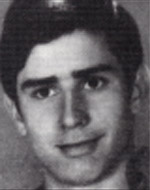Leshem, Eyal
Son of Adina and Yoel was born on October 21, 1961, and fell on June 10, 1982, on the fifth day of the Lebanon War in the Battle of Ein Zahlata, where he commanded the armored personnel carriers The missile was fired at the enemy helicopters that attacked the Israeli armored columns moving towards the Beirut-Damascus highway, and Eyal, together with six of his comrades, fell in a missile fired at them from an enemy helicopter. Aviv, from the kindergarten to the end of the Alliance high school in the biological track – a subject he loved most, and during his school years he was an outstanding sports tycoon, especially in the volleyball game. Eyal has excelled in his diligence and his ability to make decisions and leadership, and these were expressed in every field in which he worked, whether in the Ramat Aviv scouts or in the avocado plantations and his parents’ persimmon, and he dreamed of a farmer in his dreams. He played a violin, Eyal read a lot and everything, from poetry to science, and the light in his room burned until the wee hours of the night, and Eyal was very proud of his family, and at every opportunity he expressed this pride, thin and tall above all those around him. , Stubborn, yet sympathetic and fond of his friends. He knew how to stand his ground, and he was ready to argue with her as great and stronger than him. Among Eyal’s papers is a note from one of his instructors, who wrote to him at the end of the officer’s course: “Very much appreciate your courage and inner integrity, and with leadership like yours, you will succeed in everything and therefore only strong and courageous.” When he joined the army, it was clear to him that his path was to a combat unit. A few months before he was drafted, Eyal tried to improve his physical fitness by running about 12 miles each evening so that he could pass the acceptance tests for the naval commando unit, He understood that in the engineering corps, as a small force, his chances of advancement were too small, so Eyal wanted to go to the infantry officers course. The commander of the School of Combat Engineering rejected his request and concluded: “I have made it clear to him that he can not respond to his will.” Eyal remained in the engineering corps, and as part of this corps he emerged as a platoon commander for the Lebanon War, from which he did not return. In the place where he was born and raised, in Tel Aviv, Eyal was brought to eternal rest in the military cemetery in Kiryat Shaul. He leaves behind his parents, brother and sister.
